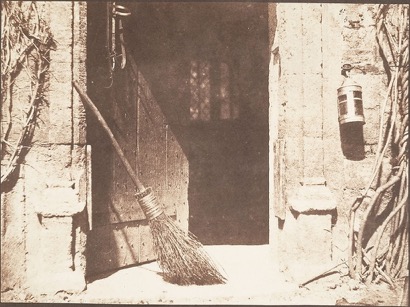InterdependenceDay

William Henry Fox Talbot, The Open Door, before May 1844
"Living free means living interdependently …"
Our kittens Max and Molly behave as if they'd rather I maintained an open door policy, for they feign fierce independence. They're apt to slip by me when I'm carting supper out onto the deck, though I'm more likely to accidently-on-purpose let them slip by me. They gleefully head for the stairway down to the backyard, where they munch long grass fronds—to later barf back up with their supper, which I will dutifully clean up without complaint—, cultivate garden beds, and roll around in the dirt before stealthily stalking birds they could not possibly catch. An hour or less later, and their independent spirit lags. Molly lies near the top of the stairs staring off into the distance while Max maintains his resistance, perhaps by climbing a tree. A shake of the kitty treats package brings them both fleeing back into accustomed dependency, though they shortly start sniffing and mewling around the door again, hoping to regain their independence. ©2020 by David A. Schmaltz - all rights reserved
Sometimes, Molly will escape and stay away for a day or longer, but eventually she'll return, contrite, looking as if she might appreciate a square meal. She'll sleep for the entire following day before quite predictably lobbying for her independence again. Independence seems exhausting. Genuine independence might serve as the very best means by which to renew an appreciation for just how Interdependent we each actually are. We seem to exist in continual relationship, with even the hermit defined by his apparent absence of company. Independence always proves to be a mythical state, one perhaps better considered as an aspiration than a reasonable, more permanent condition. We might freely aspire to it only to regret once achieving it, for even our nation, once gaining independence from Britain, survived following the break through trade and accompanying tariffs. No man is an island, not even a decent isthmus, and neither could any country ever be.
We do not celebrate interdependence with the same vehemence as we celebrate Independence Day, which I might explain by saying that Interdependence fails to maintain an adequately mythical status in our minds. We experience interdependence all the time, it's the steady, common state, and these conditions rarely spark any urge to celebrate. It would amount to celebrating breakfast, or three o'clock, both so everyday ordinary that they seem hardly noteworthy, let alone in any way celebratory. Independence, though, comes so overblown with mythos that it aches for recognition. It so wants to be the natural state that it infiltrates our daydreams. Dump this dead end job, we dream, and I could experience my rightful independence, though even the so-called independently wealthy carry a share of responsibility, and so never realize anything like complete independence from everything and everyone. Such dreams seem worthy of celebration, perhaps mostly because we feel fairly certain that we'll never have to maintain their actual realization. I might sing of such sacred separation, but I speak of my deeper and more permanent connections. Together, we're Americans. There could be no American without there first being a collective plural Americans.
Still, when Independence Day comes around, I might be found setting out the flag, upside down this year due to the catastrophic state of our spoiled America First campaign. It seems to have achieved more lasts than firsts, producing its opposite, a common result of taking too literally any mythical notion. Our rockets' red glare remind us of our worst experiences rather than of our best selves. A rocket attack produces Hell on Earth, not any kind of heaven or even freedom. We remember these means with rose-colored paintings of patriots, hardships, and growing pains, as if they actually produced any sort of independence from anything. We remain steadfastly interdependent however vehemently we might deny this fact. We act as if we're somehow superior, a conceit each of our trading partners and even our sworn enemies see right through. We're not sheep, for sure, but we can only ever aspire to become wolves or even sheep dogs. Each characterization eventually dissolves into more humblingly homogenizing realizations. We actually need each other! We're really sister and brother! No one ever maintains dominion over another for long. The price of peace and prosperity is never blood and sacrifice, but what the economists call Satisficing: we decide to be happy together.
We are not and never will be independent from each other. This state in no way discounts the value of any individual. It merely more properly frames who and what we are, and who and what we might reasonably aspire to become. We've been beating that drum of separating from The Crown for so long that we've lost a deep appreciation for who we became afterwards. We became even more interdependent upon each other, our common survival no longer guaranteed by any outside subsidizing or extracting authority. In Ben Franklin's words, "A Republic, if we can keep it." Republics are most decidedly not more independent than any monarchy, but more tenuously interdependent than any other form of popular government. They do not provide for anyone to hide behind their myths of independence, but rather continually undermine this misconception. Living free means living interdependently because no man's an island, and not even a decent isthmus, not in this world.


